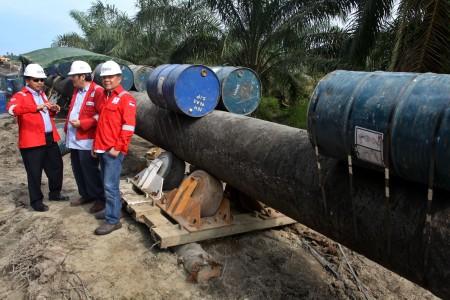Indonesia plans Pertamina acquisition of gas utility PGN
Bareksa • 17 Jan 2014

Proyek pembangunan pipa gas Arun-Belawan di Kualamadu, Langkat, Sumatera Utara (ANTARA FOTO/Dhoni Setiawan)
After the acquisition, PGN will continue as a Pertamina subsidiary
Reuters - Indonesia plans for state energy company Pertamina to acquire state gas utility Perusahaan Gas Negara (PGN), a minister said on Thursday, as Southeast Asia's largest economy moves to reduce supply bottlenecks.
With declining crude output, the former OPEC member is pushing to reduce spending on fuel subsidies and increase gas use to meet its ballooning energy demands, but the effort has been hampered by a lack of investment in infrastructure and overlapping distribution systems.
The acquisition would give Pertamina greater control over the distribution of natural gas and reduce costs, the government says. PGN controls around 80 percent of Indonesia's gas pipelines.
Competition between the two state-owned enterprises has held up the government's goal of providing cheap fuel to households, Dahlan Iskan, minister for state-owned enterprises, told reporters.
"Distribution of gas to households must become our focus. Gas should be for the people, not just for factories and exports," Iskan said in a statement.
PGN was one of the biggest losers on the Jakarta Stock Exchange on Thursday as investors veered away on talk of the merger.
After the acquisition, PGN will continue as a Pertamina subsidiary, Iskan said, adding that other details were still being discussed.
One scenario could be for PGN to acquire Pertamina's existing gas subsidiary, Pertagas, before it is swallowed up by Pertamina, Iskan said. Another could be for Pertamina to acquire PGN directly.
The government holds 57 percent of PGN, and investors including U.S. fund managers such as Capital Group, Vanguard and Matthews International own the remainder, according to its latest filing.
Several analysts said the acquisition would probably be to the detriment of PGN's private investors.
"The plan to inject Pertamina's Pertagas, with Pertamina potentially controlling the merged entity, is very negative for (PGN's) minority shareholders, given the exorbitant value it places on Pertagas (price-earnings ratio of more than 25 times and price-to-book value of more than six times)," CLSA said in a report on Wednesday.
"If executed, we estimate it could lead to an average 12 percent downside to (PGN) stock or in the worst case up to 29 percent downside," CLSA said.
The acquisition also is likely to curtail PGN's ambitions to expand upstream by acquiring oil and gas production assets, Citi analysts said in a report.
Its plan to acquire Hess Corp assets has already been blocked, Citi said. "The acquisition would have been value-creating."
Indonesia consumes about 40 billion cubic metres of gas a year, and demand is growing by at least 10 percent annually.
Two securities firms, Danareksa and Bahana Securities, are weighing the various options for the planned merger. The results of their study and a final decision on the deal are expected soon.
PGN shares closed 2.5 percent lower on Thursday, while the Jakarta stock exchange fell 0.7 percent.